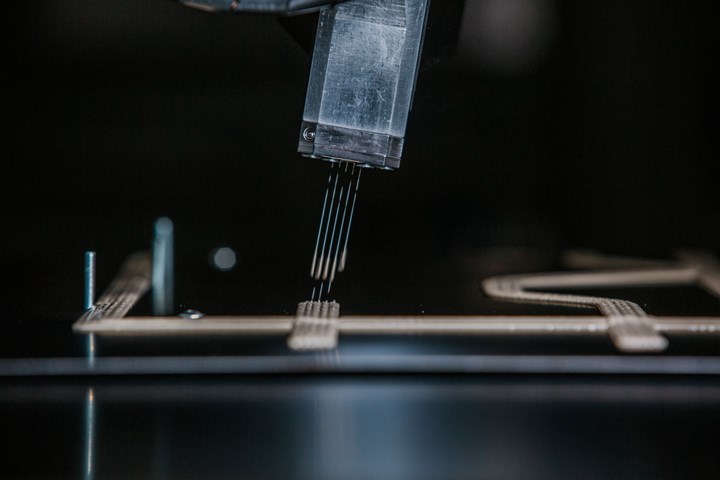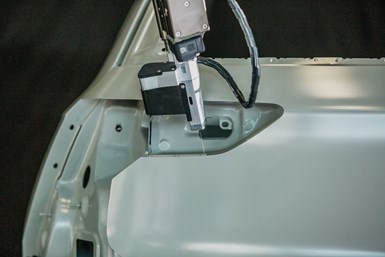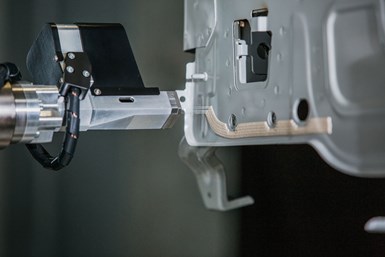Flexible Paint Applicator Automates Car Sealing Process
Dürr’s new EcoSealJet Pro applicator enables process improvements and material savings that are good for both budgets and the environment.
Dürr’s new EcoSealJet Pro applicator is designed to fully automate car manufacturing painting processes that previously had to be done manually. Photo Credit: Dürr
Dürr Systems Inc. (Southfield, Michigan) has developed a solution to further increase the level of automation and significantly reduce the need for manual intervention in the car manufacturing painting process. While many stages in this process are already highly automated, sealing is still performed manually for hard-to-reach car body parts. Dürr’s new EcoSealJet Pro applicator is designed to fully automate this process. According to the company, the applicator and associated process improvements enable maximum precision and consistent quality, leading to material savings that are good for both budgets and the environment.
The new EcoSealJet Pro applicator is designed for use wherever automation previously reached the limits of its capabilities. Dürr says the applicator is ideal not only for hard-to-access areas, such as in the engine compartment or headlight housings, but also for those areas where automatic PVC application must contend with unusual contours, holes, studs and other obstacles.
Precise application in hard-to-reach areas
The EcoSealJet Pro applicator enables precise application of materials in areas that are hard to reach. Photo Credit: Dürr
The clearance and work angle of the robot-guided EcoSealJet Pro applicator can be variably adjusted to easily access difficult body parts. Its needles are activated individually so that the applicator can apply sealant to the body with consistent precision and quality. Each needle can apply the material in jets or individual drops through the application nozzles. The robot speed and the amount of material determine the variable, high-frequency needle activation, which the company says makes the applicator extremely flexible. It reportedly can be used for seam geometries of different densities and widths that exhibit a border with high edge definition and no overspray.
Precise application and the ability to adjust material thickness as required ensures no sealant waste, according to Dürr. Additionally, individual needle activation prevents material doubling where the seams join, which results in reduction in material use. The company says this is an advantage that should not be underestimated, as reduced material thickness impacts not only the cost but leads to lower overall vehicle weight. Since the new applicator can work around add-on parts, studs and holes, masking and cleaning are said to become obsolete, saving users both time and material. These downstream processes can therefore be reduced or eliminated entirely.
Learning algorithms increase effectiveness
An increased level of automation in sealing is a real benefit, Dürr says — not only for workstation ergonomics but for cost efficiency and environmental protection. Process optimization is also an important factor, and it is supported by permanent monitoring of individual components such as pumps, temperature controls, dosing units or valves. In addition, Dürr says the applicator relies on artificial intelligence (AI) to improve manufacturing processes. The company’s DXQequipment.analytics software package analyzes machine data, detects quality problems in real-time and optimizes maintenance requirements. This means that future predictions — for example, about a product fault or a plant component needing maintenance — will become more and more precise over time. Intelligent machine learning algorithms support maintenance, which the company says results in the highest possible plant availability.
Related Content
Tin and Tin Zinc Overview and Growth
Brett Larick of Columbia Chemical discusses the increasing demand for conductive finishes driven by the increasing electrification of vehicles.
Read MorePrecise Paint Flow Reduces Material and Labor Costs
Finding a more accurate paint proportioner for its application enabled this auto parts manufacturer to save significant costs and labor while increasing capacity.
Read MoreRobots, AI and Superb BMW Surfaces
There isn’t an automotive paint shop in the world that doesn’t have post-paint inspection and defect processing. But BMW is doing this with levels of technology at a plant in Germany that exceed all other paint shops in the world.
Read MoreCoatings Plant Evolves with Market Trends
Expanding its focus from exclusively serving the RV industry, one of this company’s stand-alone coatings plant has successfully extended its services to additional markets.
Read MoreRead Next
Delivering Increased Benefits to Greenhouse Films
Baystar's Borstar technology is helping customers deliver better, more reliable production methods to greenhouse agriculture.
Read MoreA ‘Clean’ Agenda Offers Unique Presentations in Chicago
The 2024 Parts Cleaning Conference, co-located with the International Manufacturing Technology Show, includes presentations by several speakers who are new to the conference and topics that have not been covered in past editions of this event.
Read MoreEpisode 45: An Interview with Chandler Mancuso, MacDermid Envio Solutions
Chandler Mancuso, technical director with MacDermid Envio discusses updating your wastewater treatment system and implementing materials recycling solutions to increase efficiencies, control costs and reduce environmental impact.
Read More

















.jpg;maxWidth=300;quality=90)











